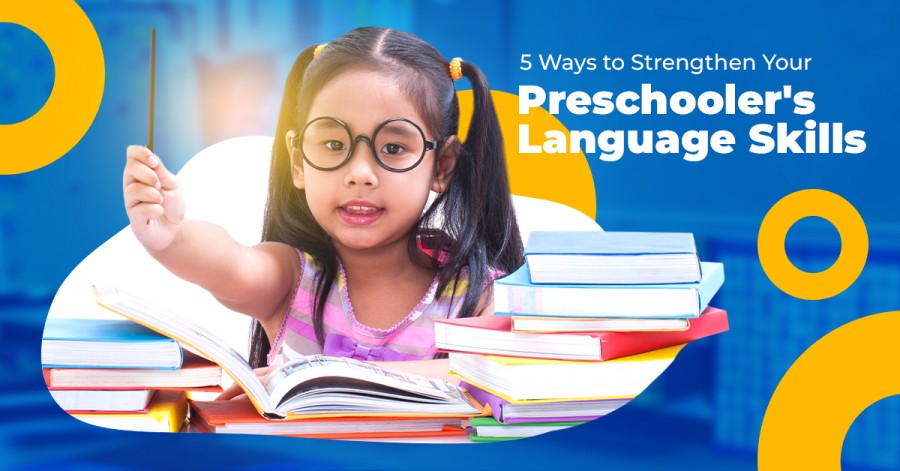5 Ways to Strengthen Your Preschooler's Language Skills
Published 06 December 2022 at 18:25
Tickikids Blog Singapore > Digest > 5 Ways to Strengthen Your Preschooler's Language Skills

Language is a universal concept that plays a big role in the overall development of children. From uttering their first words to doing their first presentation in class, our children are constantly developing their communication skills—and they’re doing so right before our eyes. As their primary caretakers, we must play an active part in helping them express themselves better through words.
Even though language development is a lifelong task, the early years are vital for establishing good speaking, listening, and writing skills. By age four and a half, your child starts to become a social individual, using language to express their needs and desires. It is also around this time when your child starts to pick up words from adult conversations to form more complex sentences. When guided properly, your child can establish a solid vocabulary and effectively use the art of communication to articulate their thoughts and get ahead in the world.
If you are a parent or a caretaker of a preschool-aged child, here are some tips for strengthening your child’s skills in language and communication.
Utilize Playtime
Learning language through play is one of the best ways to help kids develop and retain communication skills. After all, children learn best when they do things in fun and exciting ways. During playtime, it’s best to have your child play in a space where exploration can occur naturally. This can be a room filled with arts and crafts materials, building blocks, playdough, kinetic sand, and other “open-ended” items that encourage creation, inquiry, and making observations.
In addition, you can opt for fun activities, like scavenger hunting and mystery games, that will help your child develop their reading comprehension, logic, and strategic thinking. You can also play verbal games like “Red Light, Green Light, which teaches basic commands, or “Simon Says” which relies heavily on words and may help strengthen your child’s language skills. It would help to use action words (hop, skip, jump, walk) and position words (over, bottom, top, under) to refine your child’s sentence creation and listening capability.
One of the best ways to maximize the use of playtime for language learning is by allowing your child to interact with their peers. Preschools that utilize the early learning village concept, for example, promote experiential learning to build language skills in young children. With its open spaces and high-quality play facilities, this kind of early-learning environment allows children to explore their surroundings and interact with their classmates and instructors. These environments essentially give children the freedom to naturally develop their communication skills while fulfilling their social needs.

Image Credit: Pexels
Encourage Questions
Most likely, you’re already aware that preschoolers are naturally chatty. They love starting conversations, be it with themselves or others. These conversations often involve questions that adults sometimes find hard to answer such as, “Why is the sky blue?” or “How do birds fly?” Asking questions like these plays a big role in young children’s cognitive development, mostly because inquiry allows them to get targeted information and fill gaps in knowledge with absolute certainty.
You can give them definitive answers, but you can also open the floor to comprehensive conversations and explanations. You can ask your child why they think the sky is blue or how birds are able to fly. You can also veer towards open-ended questions like, “What did you do at school today?” or “Can you tell me about the friends you made at school?” Open-ended questions don’t have right or wrong answers, giving your child the freedom to express themselves without unwarranted fear of repercussions.
On a related note, it may also help to encourage your child to recognize and understand the words for their emotions to aid in their social and emotional development. Encourage your child to articulate their feelings and guide them toward the right words that best explain them.
Foster Storytelling in the Family
Children love listening to stories as much as they like telling them. When bonding with your child, consider sharing stories about what they were like as a baby—their first words, favorite food, and even funny moments. It would also help to tell stories about your own childhood to establish a connection and introduce imaginative thinking to your child. Talk about the games you used to play, the stories you like, the things you were afraid of, and the memories you consider the best—ideally while flipping through a scrapbook or photo album.
Use Music and Literature
Apart from bedtime stories and fairytales, exposing your child to songs with lyrical wordplay can also spur the development of language skills in them. Make it a habit to read at least one book with your child every day. It may help to do “active reading” and ask questions about which characters they like the most, how the story makes them feel, or how they would solve the problem if they were in the protagonist’s shoes. When telling stories, it may help to encourage dramatic play or pretend play. Engaging in these activities can motivate your child to navigate imagined scenarios and plot storylines, which would help in making them more fluent and expressive with language.
Similarly, getting your child engaged with music can be a great way for them to learn more words. Consider playing child-appropriate songs with silly, rhyming lyrics to introduce them to wordplay and make language learning a bit more fun. You can put on music at home or in the car while driving to keep them from getting bored on the road.
It’s also worth mentioning that learning how to make music can do wonders for your child’s capability to refine their communication skills. According to a study conducted by researchers from Northwestern University, musical training can establish neural connections that aid in cognitive areas such as language, memory, speech, attention, and vocal emotion. So if you sense that your child has an inclination toward music, you may want to hone that interest and develop their language-learning ability at the same time.
Practice Active Listening and Don’t Criticize
Communication is, at its core, a two-way street. As a parent, you need to be an active listener and take your child’s conversations seriously while providing input to guide them in the right direction. Children learn how to use language at home, and by fostering a healthy communicative environment, you can help your child understand the proper way to express themselves and carry on a conversation.
That said, it’s generally ideal not to be too critical when correcting your child. Focusing too much on the right spellings, pronunciations, and tenses might affect your child negatively and keep them from trying. You need to be aware of your child’s learning curve and correct them in a way that won’t embarrass them. You can do this by pointing out words and sentences and repeating them with the right verbiage so your child can process these corrections.